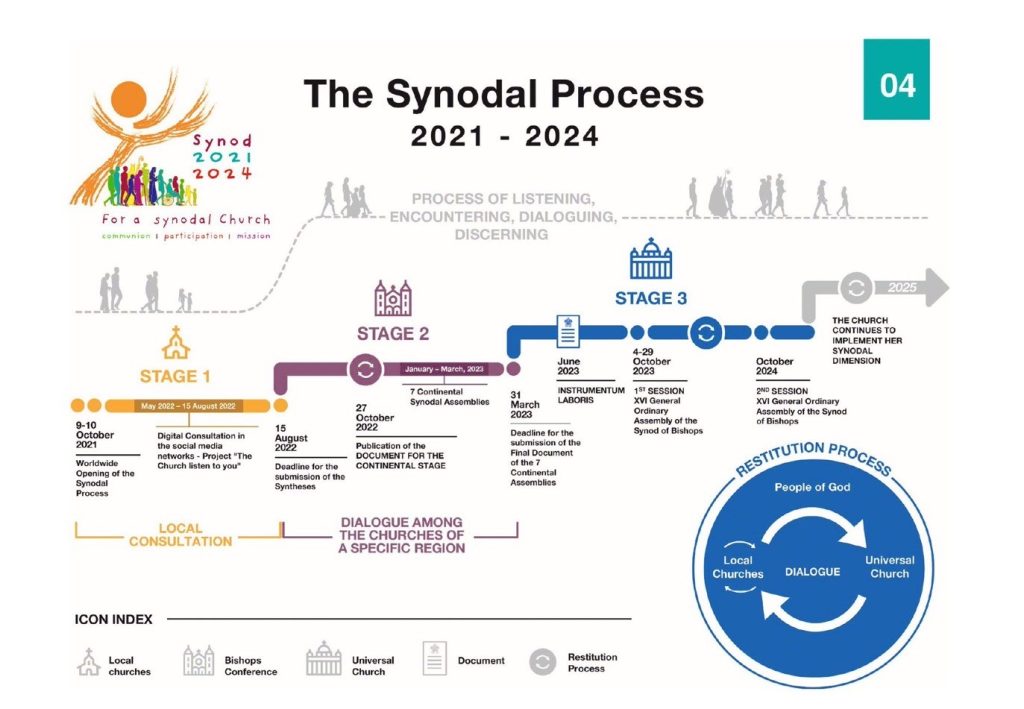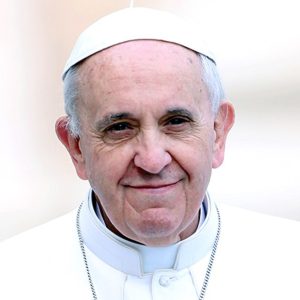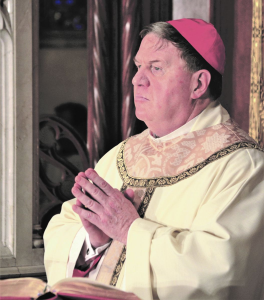From the Cardinal: Instrumentum Laboris, characteristic signs of a synodal Church | July 14, 2023
Click a button to jump to the section:

Vol. 4. No. 22
My dear sisters and brothers in Christ,
With this newsletter, I would like to begin a series of reflections inspired by the Instrumentum Laboris, the “working document” for the first session of the 16th Ordinary General Assembly of the Synod of Bishops (October 4-29, 2023).
According to Cardinal Mario Grech, Secretary General of the General Secretariat of the Synod, speaking last month at the press conference presenting the Instrumentum Laboris, The Instrumentum Laboris is not a document of the Holy See, but of the whole Church. It is not a document written at a desk. It is a document in which all are co-authors, each for the part he or she is called to play in the Church, in docility to the Spirit.
We will not find in the text of the Instrumentum Laboris a theoretical systematic explanation of synodality, but the fruit of a Church experience, of a journey in which we have all learnt more by walking together and questioning ourselves on the meaning of this experience.
Cardinal Grech assures us that this Instrumentum Laboris is a text in which no one’s voice is missing. “It is the voice of the Holy People of God; of the Pastors, who have ensured ecclesial discernment with their participation; of the Pope, who has always accompanied us, supported us, encouraged us to move forward,” Cardinal Grech says.
The Instrumentum Laboris is also an opportunity for all of us—the entire People of God—to continue the synodal journey that we have begun together, and it as an opportunity to involve those who have not been engaged so far. Our Holy Father Pope Francis eagerly desires that all of us, no matter who we are or what our situation in life is, participate in this synodal journey— through our prayer, attentive listening, respectful dialogue (especially with those who disagree with us), and our prayerful discernment of God’s will for us.
As I wrote recently in this newsletter (Vol. 4 No. 20, June 9, 2023),
Synodality begins with attentive listening and respectful dialogue, but its ultimate goal is encounter, the kind of personal engagement that leads to mutual understanding, trust and the ability to join hands as sisters and brothers who are members of the one family of God. Ultimately, synodality should lead us to a face-to-face encounter with our Lord Jesus Christ precisely because we recognize him in the faces of everyone we meet—those who are closest to us as well as strangers, even enemies.
The Instrumentum Laboris is designed to facilitate our encounter with one another and with our Redeemer. “Mutual understanding and trust” can never occur when warring factions merely shout at one another from behind barricades of ideology and defensiveness. We must learn to treat each other with the dignity and respect that is our due as human beings made in the image and likeness of our Creator.
The selection below from the Instrumentum Laboris that is provide below is intended merely to “whet your appetite” for the complete working document. (See link below.) I urge you to read it prayerfully and to reflect on the issues discussed. In the next several newsletters over the course of this summer, I will offer some of my own reflections. I invite you to do the same.
As we continue our synodal journey, let’s pray that the Holy Spirit will accompany us and show us the way.
Sincerely yours in Christ the Redeemer,
Cardinal Joseph W. Tobin, C.Ss.R.
Archbishop of Newark

INSTRUMENTUM LABORIS
A selection from INSTRUMENTUM LABORIS For the First Session (October 2023)
A 1. The characteristic signs of a synodal Church
19. Within this integral understanding, an awareness emerges of certain characteristics or distinctive signs of a synodal Church. These are shared convictions on which to dwell and reflect together as we undertake a journey that will continue to clarify and refine them, starting from the work of the Synodal Assembly will undertake.
20. This is what emerges with great force from all the continents: an awareness that a synodal Church is founded on the recognition of a common dignity deriving from Baptism, which makes all who receive it sons and daughters of God, members of the family of God, and therefore brothers and sisters in Christ, inhabited by the one Spirit and sent to fulfil a common mission. In Paul’s language, “we were all baptized into one body—Jews or Greeks, slaves or free—and we were all made to drink of one Spirit” (1Cor 12:13). Baptism thus creates a true co-responsibility among all the members of the Church, which is manifested in the participation of all, with the charisms of each, in the mission of the Church and the building up of the ecclesial community. A synodal Church cannot be understood other than within the horizon of communion, which is always also a mission to proclaim and incarnate the Gospel in every dimension of human existence. Communion and mission are nourished in the common participation in the Eucharist that makes the Church a body “joined and knitted together” (Eph 4:16) in Christ, able to walk together towards the Kingdom.
21. Rooted in this awareness is the desire for a Church that is also increasingly synodal in its institutions, structures and procedures, so as to constitute a space in which common baptismal dignity and co-responsibility for mission are not only affirmed, but exercised, and practiced. In this space, the exercise of authority in the Church is appreciated as a gift, with the desire that it be increasingly configured as “a true service, and in Holy Scripture it is significantly call ‘diakonia’ or ministry” (LG 24), following the model of Jesus, who stooped to wash the feet of his disciples (cf. Jn 13:1-11).
22. “A synodal Church is a listening Church”6: this awareness is the fruit of the experience of the synodal journey, which is a listening to the Spirit through listening to the Word and listening to each other as individuals and among ecclesial communities, from the local level to the continental and universal levels. For many, the great surprise was the experience of being listened to by the community, in some cases for the first time, thus receiving a recognition of their unique human worth that testifies to the Father’s love for each of his sons and daughters. The experience of listening and being listened to in this way serves not only a practical function but also has a theological and ecclesial depth because it follows the example of how Jesus listened to the people he met. This style of listening is necessary to mark and transform all the relationships that the Christian community establishes among its members as well as with other faith communities and with society as a whole, especially towards those whose voice is most often ignored.
23. As a Church committed to listening, a synodal Church desires to be humble, and knows that it must ask forgiveness and has much to learn. Some reports noted that the synodal path is necessarily a penitential one, recognizing that we have not always lived the constitutive synodal dimension of the ecclesial community. The face of the Church today bears the signs of serious crises of mistrust and lack of credibility. In many contexts, crises related to sexual abuse, and abuse of power, money and conscience have pushed the Church to a demanding examination of conscience so that “moved by the Holy Spirit” the Church “may never cease to renew herself” (LG 9), in a journey of repentance and conversion that opens paths of reconciliation, healing and justice.
24. A synodal Church is a Church of encounter and dialogue. On the path we have travelled, this aspect of synodality emerges with particular strength in relation to other Churches and ecclesial Communities, to which we are united by the bond of one Baptism. The Spirit, who is “the principle of the Church’s unity” (UR 2), is at work in these Churches and ecclesial Communities, and invites us to embark on paths of mutual knowledge, sharing and building a common life. At the local level, the importance of what is already being done together with members of other Churches and ecclesial Communities emerges strongly, especially as a common witness in socio-cultural contexts that are hostile to the point of persecution—this is the ecumenism of martyrdom—and in the face of the ecological emergency. Everywhere, in tune with the Magisterium of the Second Vatican Council, the profound desire to deepen the ecumenical journey also emerges: an authentically synodal Church cannot but involve all those who share the one Baptism.
25. A synodal Church is called to practice the culture of encounter and dialogue with the believers of other religions and with the cultures and societies in which it is embedded, but above all among the many differences that run through the Church itself. This Church is not afraid of the variety it bears, but values it without forcing it into uniformity. The synodal process has been an opportunity to begin to learn what it means to live unity in diversity, a fundamental point to continue exploring, trusting that the path will become clearer as we move forward. Therefore, a synodal Church promotes the passage from “I” to “we”. It is a space within which a call resonates to be members of a body that values diversity but is made one by the Spirit. It is the Spirit that impels us to listen to the Lord and respond to him as a people at the service of the one mission of proclaiming to all the nations the salvation offered by God in Christ Jesus. This happens in a great diversity of contexts: no one is asked to leave their own context, but rather to understand it and enter into it more deeply. Returning to this vision after the experience of the first phase, synodality appears first and foremost as a dynamism animating concrete local communities. Moving to the more universal level, this momentum embraces all the dimensions and realities of the Church, in a movement of authentic catholicity.
26. Lived in a diversity of contexts and cultures, synodality proves to be a constitutive dimension of the Church since its origin, even if it is still in the process of being realized. Indeed, it presses to be implemented ever more fully, expressing a radical call to conversion, change, prayer and action that is for all. In this sense, a synodal Church is open, welcoming and embraces all. There is no border that this movement of the Spirit does not feel compelled to cross, to draw all into its dynamism. The radical nature of Christianity is not the prerogative of a few specific vocations, but the call to build a community that lives and bears witness to a different way of understanding the relationship between the daughters and sons of God, one that embodies the truth of love, one that is based on gift and gratuitousness. The radical call is, therefore, to build together, synodally, an attractive and concrete Church: an outgoing Church, in which all feel welcome.
27. At the same time, a synodal Church confronts honestly and fearlessly the call to a deeper understanding of the relationship between love and truth according to St Paul’s invitation: “But speaking the truth in love, we must grow up in every way into him who is the head, into Christ, from whom the whole body, joined and knitted together by every ligament with which it is equipped, as each part is working properly, promotes the body’s growth in building itself up in love” (Eph 4:1516). To authentically include everyone, it is necessary to enter into the mystery of Christ allowing oneself to be formed and transformed by the way he lived the relationship between love and truth.
28. Characteristic of a synodal Church is the ability to manage tensions without being crushed by them, experiencing them as a drive to deepen how communion, mission and participation are lived and understood. Synodality is a privileged path of conversion, because it reconstitutes the Church in unity: it heals her wounds and reconciles her memory, welcomes the differences she bears and redeems her from festering divisions, thus enabling her to embody more fully her vocation to be “in Christ like a sacrament or as a sign and instrument both of a very closely knit union with God and of the unity of the whole human race” (LG 1). Authentic listening and the ability to find ways to continue walking together beyond fragmentation and polarization are indispensable for the Church to remain alive and vital and to be a powerful sign for the cultures of our time.
29. Trying to walk together also brings us into contact with the healthy restlessness of incompleteness, with the awareness that there are still many things whose weight we are not able to carry or bear (cf. Jn 16:12). This is not a problem to be solved, but rather a gift to be cultivated. We are faced with the inexhaustible and holy mystery of God and must remain open to its surprises as we walk through history towards the Kingdom. This also applies to the questions that the synodal process has brought to light. As a first step they require listening and attention, without rushing to offer immediate solutions.
30. Carrying the weight of these questions should not be the personal burden of those who occupy certain roles, with the risk of being crushed by them, but a task for the entire community, whose relational and sacramental life is often the most effective immediate response. This is why a synodal Church unceasingly nourishes itself at the source of the mystery it celebrates in the liturgy, “the summit toward which the activity of the Church is directed” and “the font from which all her power flows” (SC 10), particularly in the Eucharist.
31. Once the People of God are freed from the anxiety of inadequacy, the inevitable incompleteness of a synodal Church and the readiness of its members to accept their own vulnerabilities become the space for the action of the Spirit, who invites us to recognize the signs of his presence. This is why a synodal Church is also a Church of discernment, in the wealth of meanings that this term takes on within the different spiritual traditions. The first phase enabled the People of God to begin to experience discernment through the practice of conversation in the Spirit. As we listen attentively to each other’s lived experiences, we grow in mutual respect and begin to discern the movements of God’s Spirit in the lives of others and in our own. In this way, we begin to pay more attention to “what the Spirit is saying to the Churches” (Rev 2:7), in the commitment and hope of becoming a Church increasingly capable of making prophetic decisions that are the fruit of the Spirit’s guidance.
For the complete text of the Instrumentum Laboris, read below or download the document.

A Message from Pope Francis: Words of Challenge and Hope
From: Catechesis. The passion for evangelization: the apostolic zeal of the believer. 13. Witnesses: Saint Francis Xavier, General Audience, May 17, 2023
Summary of the Holy Father’s words
Dear brothers and sisters: In our continuing catechesis on apostolic zeal, we now turn to Saint Francis Xavier, the patron of the Catholic missions.
Born in Spain, Francis studied in Paris, where he met Saint Ignatius of Loyola and, together with a few companions, formed the Society of Jesus, placing themselves at the service of the Pope for the most urgent needs of the Church of their time. The sixteenth century, the age of discovery, called for a great missionary outreach. Francis set out for the East Indies, where, starting in Goa, he carried out an intense activity of preaching, baptizing, catechizing and caring for the sick. From India, he passed to the Maluku islands and from there to Japan. Unable to fulfill his dream of entering China, Francis died, at only forty-six years of age, on the nearby island of Shangchuan.
His heroic zeal for evangelization was the fruit of a life of deep prayer and loving union with the person of Jesus Christ. May the example of Saint Francis Xavier inspire our own efforts to advance the Church’s mission, as joyful witnesses to the risen Lord and his saving word.
My Prayer for You

Lord, by your Word and Example, you teach us that works of justice and mercy are a form of participation in our Church’s mission. Every Baptized person is therefore called to engage in this area. Help us to awaken, cultivate and strengthen this awareness in ourselves, our families, our parishes and in every Christian community throughout northern New Jersey and beyond. We make this prayer, dear Lord, conscious that you want us to be united with you in carrying out your Father’s will for His entire family.
